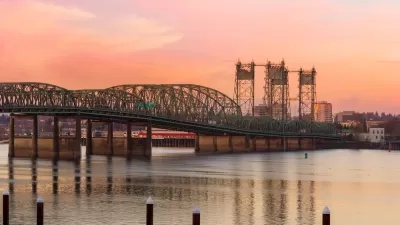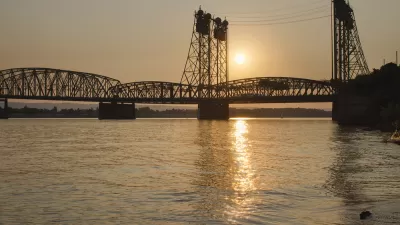A project to build a new bridge between Portland and Washington State, once scuttled by Washington lawmakers, now has an aggressive timeline. There was some financial pressure involved in getting the project to its current status.

"Federal highway officials on Tuesday endorsed an accelerated timeline proposed by Oregon and Washington transportation officials that sets the two states on a fast track toward construction on a new Interstate Bridge by 2025," reports Andrew Theen.
The federal government has a say in the matter, because if the two states had a deadline for delivering progress or they had to pay back $140 million in planning costs for the bridge, also known as the Columbia River Crossing, or CRC.
"While seeking a decade delay, the states simultaneously suggested a series of aggressive milestones, including reinitiating an environmental review of a proposed project in spring 2020 and starting construction in the summer of 2025," according to Theen.
Under the deal with the feds, the states must now have shown significant progress—buying right of way—by 2024. The two states have been picking up the pace toward reconciliation of the project, as detailed most recently by Planetizen in August 2019. Planetizen also picked up news of the project after its demise in 2014.
FULL STORY: Oregon and Washington: We’ll start building a new Interstate Bridge by 2025

Rethinking Redlining
For decades we have blamed 100-year-old maps for the patterns of spatial racial inequity that persist in American cities today. An esteemed researcher says: we’ve got it all wrong.

Planetizen Federal Action Tracker
A weekly monitor of how Trump’s orders and actions are impacting planners and planning in America.

California High-Speed Rail's Plan to Right Itself
The railroad's new CEO thinks he can get the project back on track. The stars will need to align this summer.

Santa Clara County Dedicates Over $28M to Affordable Housing
The county is funding over 600 new affordable housing units via revenue from a 2016 bond measure.

Why a Failed ‘Smart City’ Is Still Relevant
A Google-backed proposal to turn an underused section of Toronto waterfront into a tech hub holds relevant lessons about privacy and data.

When Sears Pioneered Modular Housing
Kit homes sold in catalogs like Sears and Montgomery Ward made homeownership affordable for midcentury Americans.
Urban Design for Planners 1: Software Tools
This six-course series explores essential urban design concepts using open source software and equips planners with the tools they need to participate fully in the urban design process.
Planning for Universal Design
Learn the tools for implementing Universal Design in planning regulations.
City of Camden Redevelopment Agency
City of Astoria
Transportation Research & Education Center (TREC) at Portland State University
Regional Transportation Commission of Southern Nevada
Toledo-Lucas County Plan Commissions




























